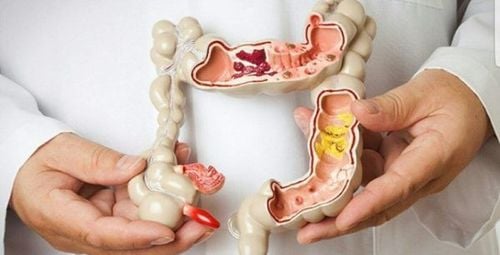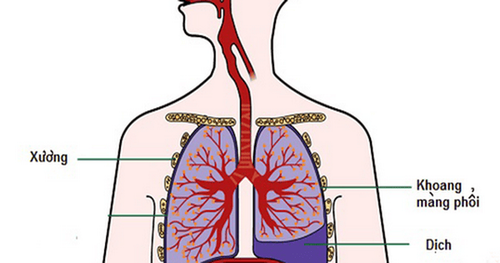This article is professionally reviewed by Vu Van Quan, MSc., MD., Deputy Head of General Surgery - General Surgery & Anesthesiology Department, Vinmec Hai Phong International General Hospital.
Tuberculosis (TB) is a bacterial infection that remains a major public health issue, with the potential to spread and pose life-threatening risks to patients. Among various forms, intestinal tuberculosis (intestinal TB) is common in developing countries. It often presents with non-specific clinical symptoms, making diagnosis challenging and increasing the risk of complications.
1. What is Intestinal Tuberculosis?
Intestinal tuberculosis refers to TB infections occurring within the digestive system. It is often mistaken for other gastrointestinal diseases due to overlapping symptoms. Most commonly, intestinal TB affects individuals aged 30–55 and is often associated with other TB infections, such as pulmonary TB.
Intestinal tuberculosis can be categorized into two types: primary intestinal tuberculosis and secondary intestinal tuberculosis, depending on how the infection develops and spreads in the body. Intestinal TB can be primary or secondary, caused by tuberculosis bacteria from other organs in the body. Primary intestinal TB is caused by tuberculosis bacteria in cows that enter the body via intermediate food such as cow's milk, which is extremely rare in clinical practice. Secondary intestinal TB, on the other hand, is more common and arises when a patient comes into touch with or swallows sputum carrying tuberculosis bacteria.
Secondary intestinal tuberculosis can be infected after the patient has pulmonary TB, esophageal TB, peritoneal TB or pharyngeal TB. Tuberculosis bacteria enter the intestine through the digestive tract, reside in the intestine and then continue to other structures such as bloodstream or bile ducts. Intestinal tuberculosis bacteria can be human TB bacteria, animal TB bacteria such as buffalo, cow or pig. TB bacteria can enter the small intestine and ileum because they are not affected by gastric digestive juices due to the protective layer of fat, in addition, TB bacteria can also invade some other digestive organs such as the jejunum and duodenum due to this feature. If there is excess lymphatic tissue and little digestive bacteria as well as stagnation in the ileum, it will create favorable conditions for the formation of ileocecal TB.

Furthermore, TB bacteria that go from the blood to the intestines and cause illness, such as miliary tuberculosis, are also responsible for intestinal tuberculosis. Another aspect to consider is that even when the TB bacilli are latent, they can be fully activated to produce sickness if the patient's immune system is compromised and incapable of resisting this bacteria.
Common Symptoms
Systemic symptoms: Fever, unexplained weight loss, fatigue and night sweats
Gastrointestinal symptoms:
- Nausea
- Abdominal pain (localized or diffuse, often in the right iliac fossa). There may be abdominal cramps or rumbling
- Diarrhea lasting for an extended period
- Bloody stools
- Constipation
Risk Factors for Intestinal Tuberculosis
- Weakened immune systems (e.g., HIV/AIDS)
- Malnourishment or low body weight
- Corticosteroid use or immunosuppressive therapies for autoimmune diseases
- A history of prior TB infections
- Direct contact with TB patients
- Exposure to environmental pollutants (e.g., silica dust)
- Comorbidities like diabetes, head and neck cancer, or Hodgkin’s disease

2. Is Intestinal Tuberculosis Contagious?
Intestinal tuberculosis itself is not contagious through food or respiratory droplets. However, patients with co-existing pulmonary TB can transmit the disease via airborne droplets. Contact with bodily waste (feces or urine) of an infected individual does not lead to transmission of intestinal TB.
If a patient is diagnosed with isolated intestinal TB (without TB in other organs), the disease poses no risk of direct transmission to others. That said, given that intestinal TB often coexists with other TB infections (especially pulmonary TB), the risk of transmission through respiratory pathways remains present. To minimize risks, patients should follow strict hygiene practices, such as covering their mouth when coughing or properly disposing of sputum. If after treatment, the patient is tested and the results show that he is no longer infected with intestinal TB, he can return to regular activities.
3. How Dangerous is Intestinal Tuberculosis?
Intestinal tuberculosis is classified as a public health disease, as it can potentially spread and poses significant health risks. If left undiagnosed or untreated, it can lead to life-threatening complications. However, early diagnosis and strict adherence to the two-phase treatment regimen—comprising the intensive phase and maintenance phase—can successfully cure the disease.
Potential Complications
- Bowel obstruction refers to intestinal obstructions caused by scar tissue or inflammation. It is vital to monitor and diagnose intestinal blockages as soon as possible in order to do emergency surgery on the patient.
- Other complications of intestinal TB, such as peritoneal perforation and peritonitis, necessitate prompt surgical intervention.

Dietary Recommendations
Patients with intestinal TB should avoid consuming foods that are overly solid or cause constipation, as these can negatively impact the digestive system. Instead, they should maintain a diet that includes liquid, soft, easily digestible foods and increase green vegetables in the daily menu to increase the ability to be laxative.
Intestinal tuberculosis is a serious bacterial infection that poses a significant threat if not diagnosed and treated promptly. If you experience persistent abdominal pain, weight loss, or other symptoms mentioned above, consult a medical professional immediately. Early diagnosis is key to managing the disease effectively.
Vinmec International Hospital offers state-of-the-art diagnostic and treatment options, led by experienced specialists in infectious diseases. Patients can trust Vinmec for accurate diagnosis and effective treatment tailored to their needs.
To arrange an appointment, please call HOTLINE or make your reservation directly HERE. You may also download the MyVinmec app to schedule appointments faster and manage your reservations more conveniently.














